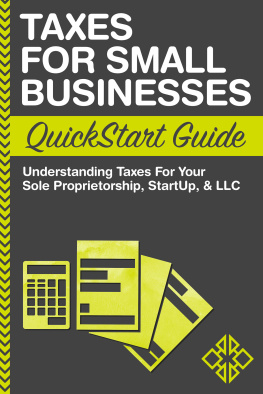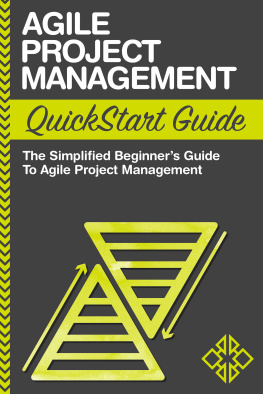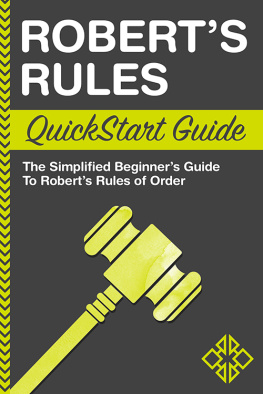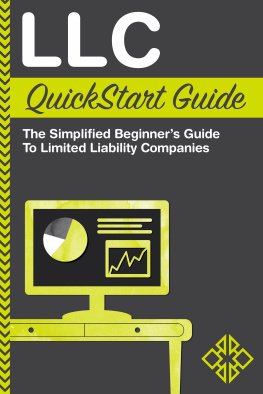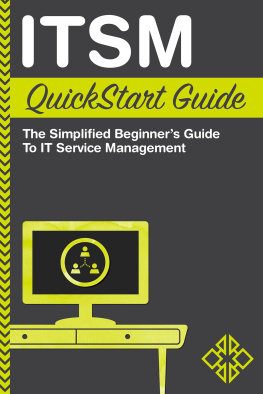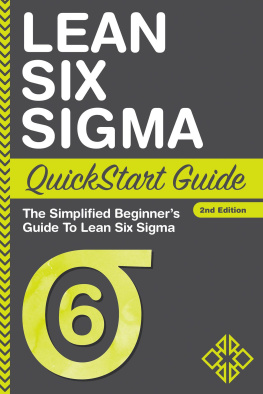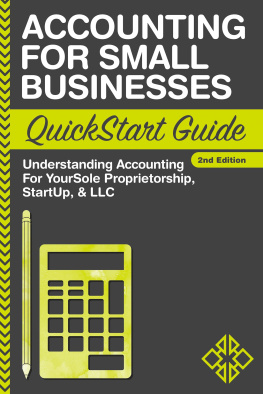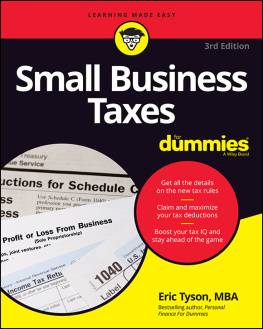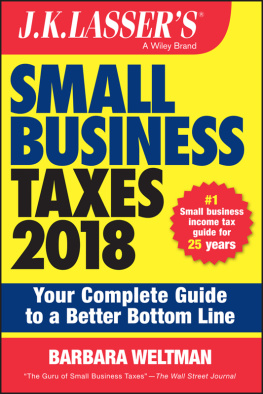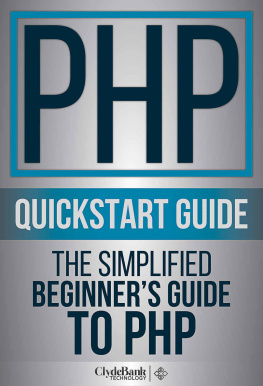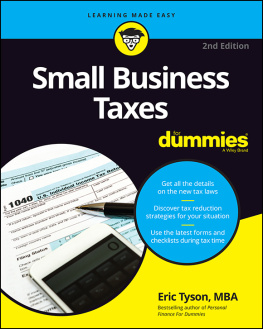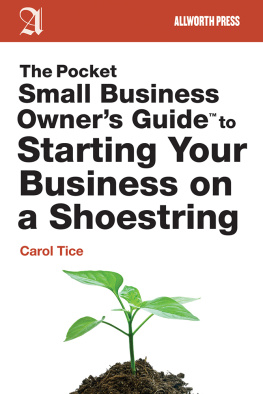Contents
Landmarks
TAXES FOR SMALL BUSINESSES
Understanding Taxes For Your Sole Proprietorship, Startup, & LLC
Contents
Terms displayed in bold italic can be found defined in the glossary.

BEFORE YOU START READING,
DOWNLOAD YOUR FREE DIGITAL ASSETS!
Visit the URL below to access your free Digital Asset files that are included with the purchase of this book.

DOWNLOAD YOURS HERE:
www.clydebankmedia.com/taxes-assets
Introduction
Taxes are a significant expenditure for any business, large or small. They must be readily considered and incorporated into your business plan from the very beginning. Understanding them, however, can be a chore.
Benjamin Franklin said, In this world, nothing can be certain except death and taxes, and taxes can be a whole lot more complicated than death.
The typical small business owner works three to four months just to earn enough profit to pay taxes. As a matter of fact, the largest single expense for most small business owners is their annual tax bill. But thats all part of operating your own business, and the process of planning for, collecting, and paying taxes neednt be complicated. The basic information offered in this book will provide you with the material you need to maximize your understanding of a variety of tax laws and to keep you in compliance and out of trouble.
Though you may be inclined to want to turn all of your tax questions, issues, and problems over to an accountant, its still important for you - the small business owner to understand the ins and outs of the U.S. tax system. However, its also essential to recognize that this is an ever-changing system, full of modifications that seem to come out almost annually. That means staying in the loop might require some regular education and research as well as consultations with any tax professional you might hire.
| 1 | The Basics
Simply put, youre required by law each year to complete the tax forms that pertain to your business. You MUST complete these forms or you face penalties from the various entities that demand the reporting. There are deadlines for filing each as well, so its important to get a handle on whats due and when it should be submitted.
I t all starts with good accounting.
Cash vs. Accrual-Based Accounting
Formally speaking, it is proper for businesses to choose and rely on accrual-based accounting rather than cash-based accounting for generating financial reports to submit to banks, partners, and other parties, but, when it comes to reporting tax liability, cash-based accounting is the preferred method. (If youre not clear on the difference see the Glossary of Terms at the end of this text.) The important thing to know is that many well-run businesses need to maintain two distinct accounting record systems: an accrual system for their business and financial management and a cash system to determine their appropriate tax liabilities.
Just as is the case when filing personal taxes, youll be filing your business tax returns at various levels.
The Federal Level
Federal taxation is primarily focused on taxing the profits (or income) of your small business. Though the state you live in may also collect income tax (not all states do), the largest income tax you pay is to the federal government.
If you have employees, you must submit your employees tax withholdings to the federal government, along with your share of payroll taxes, including 50% of the Medicare and Social Security taxes, as well as FUTA-based taxes, which are reviewed in detail in Chapter 3.
If youre filing on your own without help from a tax preparer, you may find yourself a bit confused about which forms to use.
H ere is a quick overview:
Sole Proprietorships file a Form 1040 and a Schedule C or C-EZ, depending on your expenses. If you are a farm business, you also need to file a Schedule F.
Partnerships file a Form 1065 to report their incomes, gains, losses, and deductions. A partnership does not pay tax on its income but, rather, passes through profits and losses to its partners.
C Corporations are taxed as separate entities and must file annually via a Form 1120.
S Corporations are pass-through entities (see more about this in the next chapter). Shareholders of S Corporations report the flow-through of income and losses on their personal tax returns and are assessed at their individual tax rates. Nonetheless, an informational Form 1120S must be filed.
Limited Liability Companies that are single-member LLCs file Form 1040 along with a Schedule C, E, or F, whereas multiple-member LLCs need to file a Form 1065.
Forms 1120, 1120S, and 1120A are due to the IRS by March 15th of each year for the previous year. Forms 1040 (and its variants), Schedule C, and Form 1065 are due to the IRS by April 15th.
If youre tackling this without help, companies such as Turbo Tax offer good guidance, or you may call the IRS or log onto their website for more specific information.
The State Level
Each state in the U.S. has its own set of tax laws. Your tax requirements for your state largely depend on your business structure (LLC, sole proprietorship, S corporation, etc.).
Businesses with employees are required to pay employment taxes. All states, for example, demand taxes associated with unemployment insurance and workers compensation insurance.
In addition to taking their share of income taxes, states tend to rely heavily on collecting sales taxes . If you sell goods or services (as most do), then you are responsible for collecting sales tax and submitting the revenue to your states Board of Equalization according to the timetable mandated by your state authority.
States also collect whats known as use tax , which is a type of excise tax on a good or service purchased outside the state for which no sales tax was collected. The internet shopping company, Amazon, recently brought up the issue of use tax for discussion since many products purchased on Amazon are sold without the addition of sales tax. As a rule, if the item purchased for use by your small business is not a food item and would have been taxed had it been sold in your state, then you owe your Board of Equalization a use tax for that item.
If the business is purchasing items for retail sale, then no sales tax needs to be paid. The sales tax is collected when the item is sold to the end consumer.
Note : If a small business owner gives to himself or someone else merchandise that was purchased for retail sale, then the small business owner is required to pay a use tax for that item, as it was purchased without paying sales tax and then used by the business owner as a gift (to himself or someone else).
Websites for the government of each state offer tax information for those who are trying to decipher the tax laws of their particular locales.

